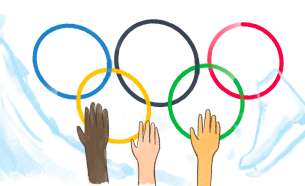The 2022 Winter Olympics, hosted in Beijing, China, has brought about many firsts in cultural representation: Donovan Carrillo is the first Mexican figure skater in thirty years competing at the Winter Olympic games, Nathan Chen is the first Asian-American male to win an Olympic gold medal, and Erin Jackson is the first Black woman to win an individual medal in speed skating. About one hundred seventy-eight athletes at the 2022 Winter Olympic games competed for countries other than the country in which they were born, as the current Olympic Charter allows competitors who identify as nationals of 2 or more countries to choose which country they want to represent.

Responding to the current way in which the Olympics handles diversity, Maddy Slater ’22, co-chair of the Deerfield Mixed Student Alliance, commented, “I think it’s a good thing that [Olympic athletes] are able to choose which country to represent. My mom was born in Korea and now she lives in the U.S, but I can see how her connections to her Korean roots, were she to be an athlete, would be important to her.” Although Eileen Gu and Zhu Yi, two Chinese-American athletes who sacrificed their U.S. citizenship to represent China, are among the athletes most dis- cussed in the media regarding current tensions in representation, many previous Olympic athletes have also chosen to represent a country rooted in their family’s heritage rather than competing for the country of which they are a citizen, such as Gus Kenworthy (British-American), Jazmine Fenlator-Victorian (Ecuadorian-American), Giovanni Lanaro (Mexican-American), and Becky Hammon (Russian-American).
When discussing the importance of representation in the Olympics, Rosnel Leyva-Cortes ’22, co-chair of the Latin American Student Alliance, said, “Sports are a very pure expression of self and as a performative action, you want markers of your identity to be at the forefront of that, especially at such a high level like the Olympics.” He continued, “Athletes are often represented by their countries because that is a marker of their identity they want to display that is also associated with their achievements.”
Recently, tension has grown, most prominently on social media, surrounding the issue of country representation concerning athletes of multiple ethnic backgrounds. Eileen Gu has particularly received both criticism and praise for choosing to compete for Team China rather than Team USA, as she claimed to strive to foster a connection between countries. In an interview with the Olympic Channel, Gu shared, “When I’m in China, I’m Chinese. When I’m in the U.S, I’m American.” She added, “[Audiences] understand that my mission is to foster a connection between countries and not a [act as a] divisive force.”
When asked about her opinion regarding Gu’s decision, Slater commented, “Sometimes it can be frustrating to see someone who grew up in the U.S. representing another country, but coming from a mixed background, I can totally empathize with feeling connected to two different places. You really have to do what makes you happy.”
Jose Briones, Sr. Associate Director of Admission and faculty advisor of the Foreign American Alliance, agreed, saying, “An athlete should compete for a country they are loyal to as we are coming to a world where we can’t label people.”
In response to the choices facing many multi-ethnic athletes, Leyva-Cortes added, “The problem with having a split identity is that, as a Cuban, I understand that you are proud of your country; but you are not proud of what the government does. That is why [many athletes in Cuba] have to disband from their Cuban identity and take on another country that supports them in their expression of their medium, which isn’t an inherent part of their identity.”
Not only have many athletes expanded the previous understanding of representation at the Olympics by striving to embody all parts of their identity, but many are also forced to face socioeconomic inequity regarding the resources that a country can provide for them to succeed in their sport. This inequity raises the issue of inherent disadvantages countries with a low GDP face when attempting to meet the economic needs of their athletes at the Olympics.
For example, Mexican skater Donovan Carrillo was forced to carry out his Olympic training at a rink in Plaza Mayor Mall in Mexico, as Mexico does not have the resources to provide for an Olympic-sized rink. Additionally, in order to afford the expensive sport of figure skating, he teaches ice skating lessons at the rink at which he trains.
Leyva-Cortes commented on the interconnectedness of socio-economic needs of athletes and their choice for representation, emphasizing, “You also have to reconcile the fact that [Olympic competitors] are also athletes and if the country they are representing that aligns with their identity is not giving them the resources necessary to do that, then they may choose to make that decision for themselves [of representing another country].”
Regardless of the country they are representing, generations of Olympic athletes embody the virtues of hard work, dedication, and persistence as they pursue their passions on a world stage while inspiring future generations with the beauty and potential of intersectionality across cultures.

